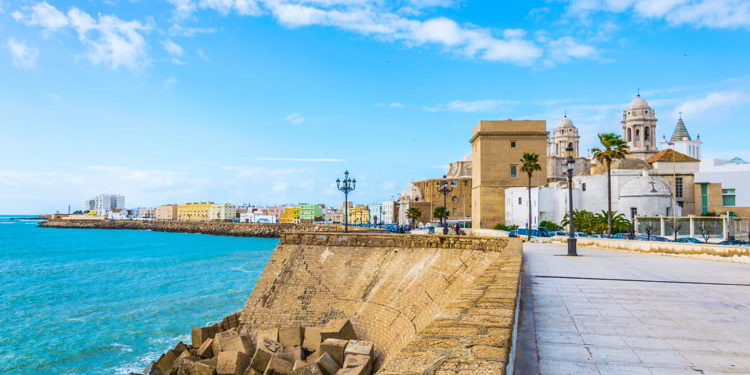Iván Ricoy is passionate about Andalucía… so much so, in fact, that, after a 10-year career as a telecom engineer, he launched his own travel company, Genuine Andalusia.
Iván delivers bespoke trips (private walking tours, day trips, extended tours, and more) to ensure that visitors experience the best of what Andalucía has to offer.
We sat down with him to expand my knowledge of this enigmatic region.
Here’s a snapshot of our conversation…
LIOS: Do you think that Cádiz Province makes sense for retirees?
Iván: For a long time, Cádiz was looked down upon by the other regions of Spain, and its people were almost seen as backwards because they don’t seem to have the same ambition that drives other parts of the Western World…
People here are content with achieving just what is needed to get by. This is still true today. Cádiz Province isn’t a massive tourism destination because there’s limited marketing for the region… and what little marketing there is isn’t very good!
It’s actually the foreigners that live here that do most of the quality marketing, and they own many of the local business that attract international tourists, like some boutique hotels, for example.
Nowadays, the national perception of Cádiz is changing. It’s becoming more popular with people from other parts of Spain for the very thing it was previously looked down on for: its laid-back outlook on life.
It has almost a post-modern appeal… people are now seeking out the slow, family-oriented pace of life that Cádiz is known for. I think this could make it very appealing to foreign retirees as well.
LIOS: What stands out about the people of Cádiz Province?
Iván: If Cádiz was one of Spain’s children, it’d be the independent one. It kind of does its own thing and is unconcerned about what the rest of the country is up to…
People here are very resourceful and have unique skills, like plumbing, sewing, designing their own rain-catchment systems for their homes, growing the best tomatoes, and so on.
No one is one-dimensional… They just don’t tell you about their skills unless you specifically ask about them.
For example, I just found out that a friend that I’ve known for a long time makes elaborate flamenco dresses and was a seamstress earlier in life. When I asked her why she didn’t tell me about her skills, she said, “You didn’t ask!”
People from Cádiz are also very friendly. They are excited that foreigners want to come here and see how they live. I often bring my tour groups to a family-run vineyard, for instance, to see how wine is made, and this has become a source of pride for the family.
It might be a humble way of life, but it’s validating for them that people come all the way from the United States and other places to see it.
LIOS: How would you describe the local culture?
Iván: People here absolutely work to live, not live to work. Jobs and careers don’t define people from Cádiz, and they are generally content to earn just enough to cover their expenses.
They have a different definition of success that is not about sacrificing your time and energy to earn as much as possible. They have a greater appreciation for the simple things in life, which are probably the things that make you truly happy.
Tourists always ask me about the unemployment rates here, and the truth is that people here are OK with unemployment as long as they have a place to live and enough money for their basic needs.
If you’re entrepreneurial, you can do really well in Cádiz because there’s little competition and people will work really hard for you if you give them direction and a decent salary.
Also, I’d say that the culture is relaxed and fairly liberal. People are too busy living their own lives to pay much attention to what anyone else is doing.
LIOS: How do you think retirees would fit into this culture?
Iván: Foreign retirees will need to do some mental adapting and reprioritizing if they come here… The slower pace of life takes some getting used to.
Also, Cádiz isn’t a big city environment; you don’t have lots of museums, theater, excitement, action, entertainment, etc. If you want those things, you have to create them for yourself.
People who settle here tend to be nature-lovers… This region is unspoiled, and there are lots of opportunities to hike in the surrounding hillside, explore empty beaches, and so on.
Older people are very respected in Andalucía. They live their lives to the fullest until the very end. You’ll see that if you come here. Older people still socialize in the plazas, play dominoes, babysit their grandkids at the beach, and do exercise classes together.
This is especially true about older women from Andalucía. They are my inspiration for aging elegantly. They still get dressed up, do their hair and makeup, go out with their friends to restaurants and cafés, and so on. And they are sassy! You’ll learn this if you ever get into a conversation with one.
In other places, homes for older people are pushed outside of the city centers to suburbs and places where there is nothing going on. This isn’t the case in Andalucía. Even in Sevilla, the busiest city in the region, older people live right in the center and are part of the community.
LIOS: What can you tell us about Spain in general as a retirement destination?
Iván: Spain is a massive country with many pockets of culture. It is a mountainous country, and this geography led to isolation of different groups of people, so that’s why you have the Basque region with its unique language and culture, Catalonia, Galicia, Andalucía, and so on.
The cost of living is very low in Spain, especially in the context of Western Europe. Property is still inexpensive although it’s rising in some areas because of interest from people from other parts of the country.
Spanish skills are really important if you move here… Locals will help you out when they can, but there’s a limit to how much you can integrate into the community if you don’t speak Spanish.
Another downside to Spain is that we pay a lot in taxes, but we also have excellent health care that works well for us. We know we will be taken care of by the health system when we need it.
LIOS: It seems like, to discover all the nuance and get to experience the true Andalucía, people have to join your tours! What can they expect if they do?
Iván: I love meeting new people. I love the injection of cultural difference, the interesting conversations you can have, and interacting with people from all over the world.
Some people who go on my tours have massive realizations about their lives… They might be sitting on the terrace of a family vineyard sipping wine and watching the sun set, surrounded by the rolling hillsides of Andalucía, and realize how simple life could be.
The family who runs the vineyard might not have an elaborate lifestyle, but they get to do this—what tourists have traveled thousands of miles to experience—every evening.
It might make them question their lifestyle up until that point… but it’s never too late to come to the realization that you’d like a simpler life.
Sophia Titley
Managing Editor, Overseas Living Letter











